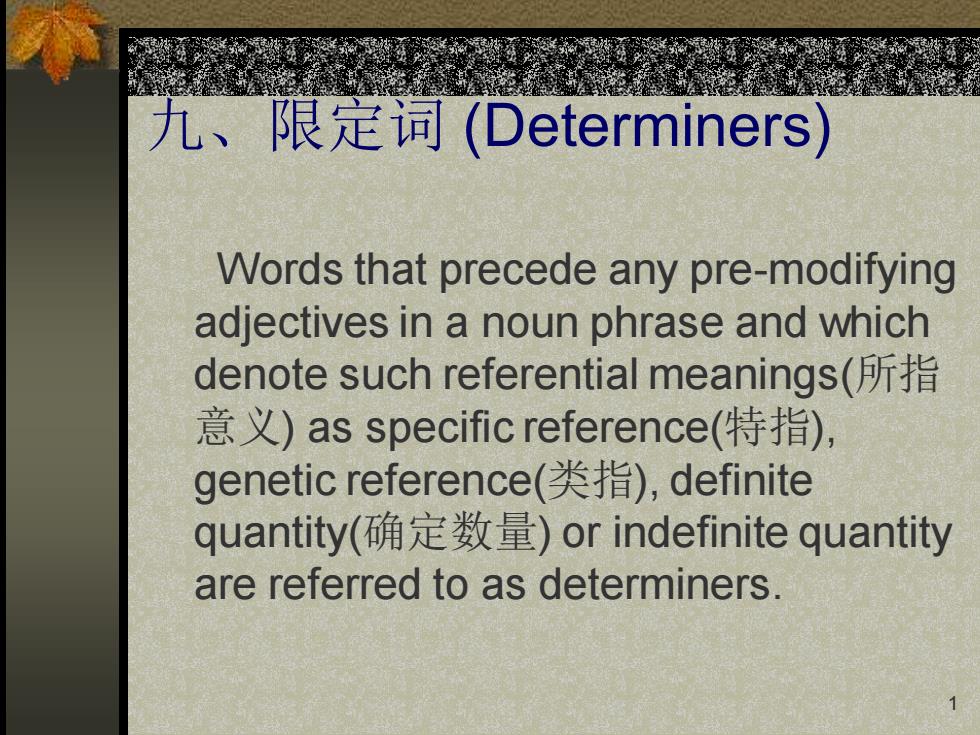
九、限定词(Determiners) Words that precede any pre-modifying adjectives in a noun phrase and which denote such referential meanings(所指 意义)as specific reference(特指), genetic reference(类指),definite quantity(确定数量)or indefinite quantity are referred to as determiners. 1
1 九、限定词 (Determiners) Words that precede any pre-modifying adjectives in a noun phrase and which denote such referential meanings(所指 意义) as specific reference(特指), genetic reference(类指), definite quantity(确定数量) or indefinite quantity are referred to as determiners

Determiners,as a class of words,includes: Definite Article,Indefinite Article,Zero Article ■Possessive Determiner(物主限定词):my,your, his,her,our,their,one's,its Genitive Noun(名词属格):John's,y friend's Demonstrative Determiner(指示限定词):this, that,these,those,such ■Relative Determiner(关系限定词):whose, which Interrogative Determiner(疑问限定词):what, which,whose
2 1、Classification of determiners Determiners, as a class of words, includes: ◼ Definite Article, Indefinite Article, Zero Article. ◼ Possessive Determiner(物主限定词): my, your, his, her, our, their, one’s, its ◼ Genitive Noun(名词属格): John’s, my friend’s ◼ Demonstrative Determiner (指示限定词): this, that, these, those, such ◼ Relative Determiner(关系限定词): whose, which ◼ Interrogative Determiner(疑问限定词): what, which, whose
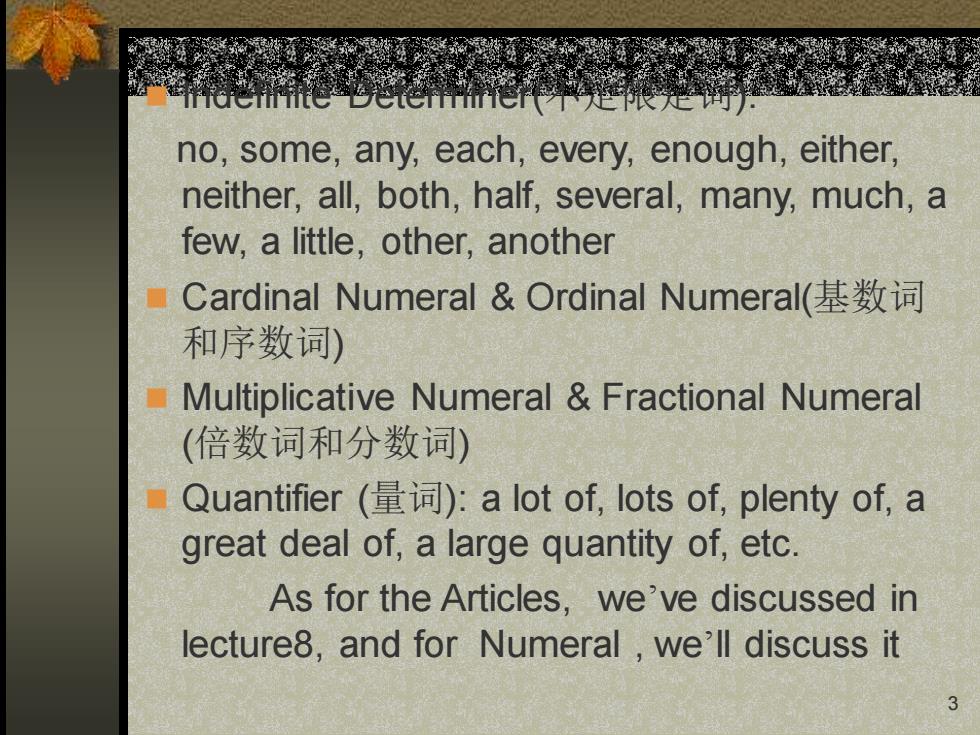
no,some,any,each,every,enough,either, neither,all,both,half,several,many,much,a few,a little,other,another ■Cardinal Numeral&Ordinal Numeral(基数词 和序数词) Multiplicative Numeral Fractional Numeral (倍数词和分数词) ■Quantifier(量词):a lot of,.lots of,plenty of,a great deal of,a large quantity of,etc As for the Articles,we've discussed in lecture8,and for Numeral,we'll discuss it 3
3 ◼ Indefinite Determiner(不定限定词): no, some, any, each, every, enough, either, neither, all, both, half, several, many, much, a few, a little, other, another ◼ Cardinal Numeral & Ordinal Numeral(基数词 和序数词) ◼ Multiplicative Numeral & Fractional Numeral (倍数词和分数词) ◼ Quantifier (量词): a lot of, lots of, plenty of, a great deal of, a large quantity of, etc. As for the Articles, we’ve discussed in lecture8, and for Numeral , we’ll discuss it
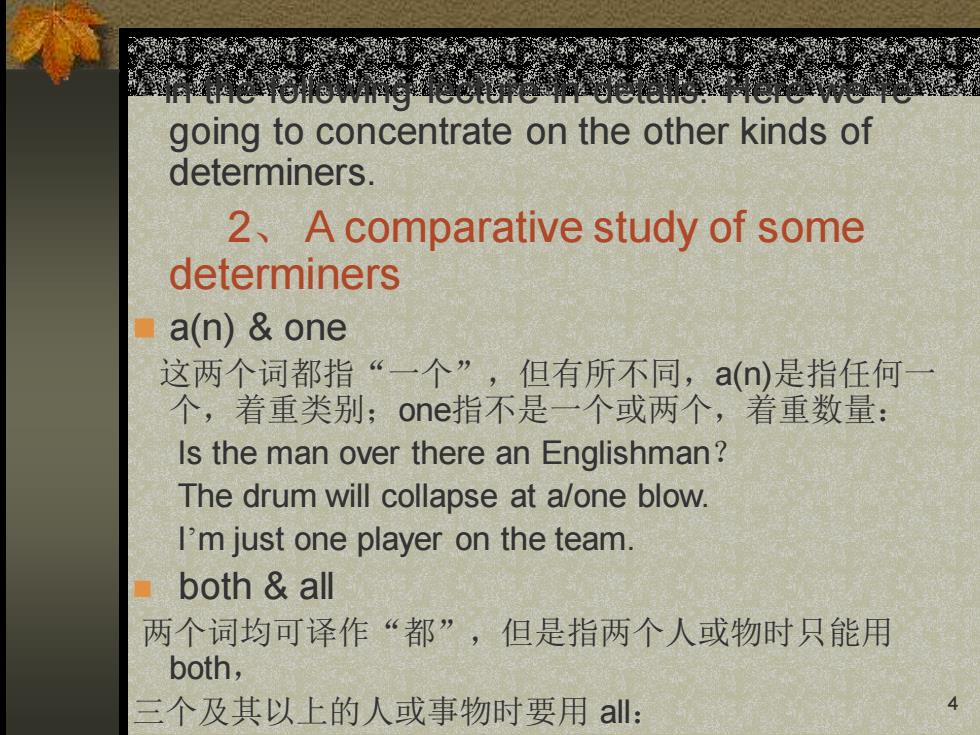
going to concentrate on the other kinds of determiners 2.A comparative study of some determiners a(n)&one 这两个词都指“一个”,但有所不同,a()是指任何 个,着重类别;one指不是一个或两个,着重数量: Is the man over there an Englishman? The drum will collapse at a/one blow. I'm just one player on the team. both all 两个词均可译作“都”,但是指两个人或物时只能用 both, 三个及其以上的人或事物时要用al:
4 in the following lecture in details. Here we’re going to concentrate on the other kinds of determiners. 2、 A comparative study of some determiners ◼ a(n) & one 这两个词都指“一个”,但有所不同,a(n)是指任何一 个,着重类别;one指不是一个或两个,着重数量: Is the man over there an Englishman? The drum will collapse at a/one blow. I’m just one player on the team. ◼ both & all 两个词均可译作“都”,但是指两个人或物时只能用 both, 三个及其以上的人或事物时要用 all:
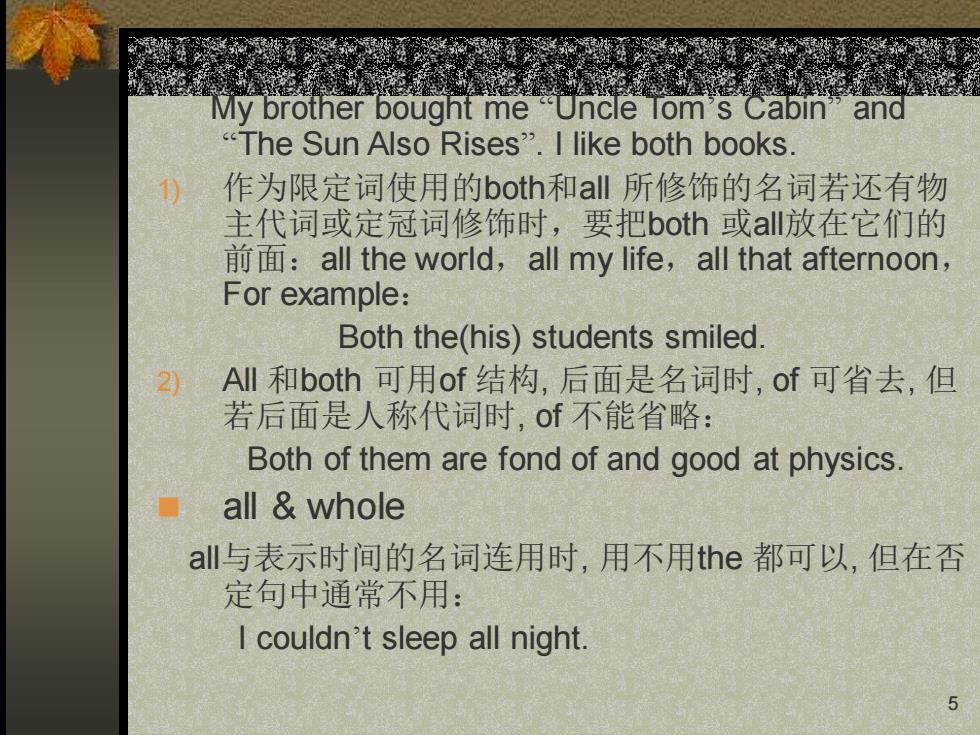
密 My brother bought me Uncle Tom s Cabin and "The Sun Also Rises".I like both books. ) 作为限定词使用的both和al所修饰的名词若还有物 主代词或定冠词修饰时,要把both或al放在它们的 前面:all the world,all my life,all that afternoon, For example: Both the(his)students smiled 2) All和both可用of结构,后面是名词时,of可省去,但 若后面是人称代词时,of不能省略: Both of them are fond of and good at physics all whole a与表示时间的名词连用时,用不用the都可以,但在否 定句中通常不用: I couldn't sleep all night. 5
5 My brother bought me “Uncle Tom’s Cabin” and “The Sun Also Rises”. I like both books. 1) 作为限定词使用的both和all 所修饰的名词若还有物 主代词或定冠词修饰时,要把both 或all放在它们的 前面:all the world,all my life,all that afternoon, For example: Both the(his) students smiled. 2) All 和both 可用of 结构, 后面是名词时, of 可省去, 但 若后面是人称代词时, of 不能省略: Both of them are fond of and good at physics. ◼ all & whole all与表示时间的名词连用时, 用不用the 都可以, 但在否 定句中通常不用: I couldn’t sleep all night
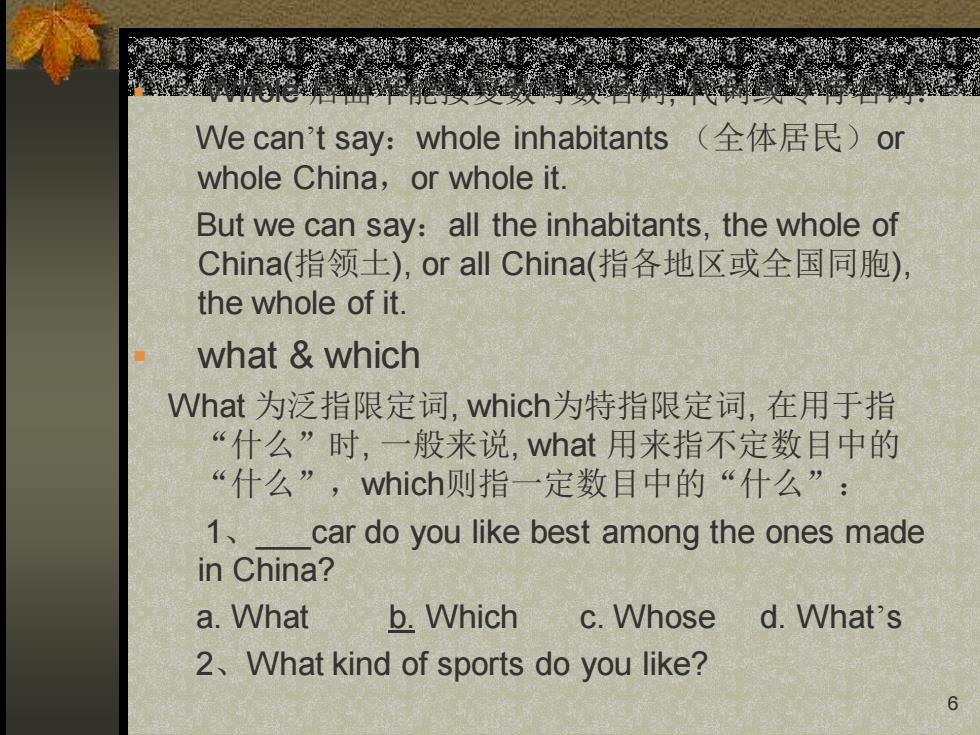
Ve can'tsay:whole inhabitants(全体居民)or whole China,or whole it. But we can say:all the inhabitants,the whole of China(指领土),or all China(指各地区或全国同胞), the whole of it. what which What为泛指限定词,which为特指限定词,在用于指 “什么”时,一般来说,what用来指不定数目中的 “什么”,which则指一定数目中的“什么”: 1、 car do you like best among the ones made in China? a.What b.Which c.Whose d.What's 2.What kind of sports do you like? 6
6 ▪ Whole 后面不能接复数可数名词, 代词或专有名词: We can’t say:whole inhabitants (全体居民)or whole China,or whole it. But we can say:all the inhabitants, the whole of China(指领土), or all China(指各地区或全国同胞), the whole of it. ▪ what & which What 为泛指限定词, which为特指限定词, 在用于指 “什么”时, 一般来说, what 用来指不定数目中的 “什么” ,which则指一定数目中的“什么” : 1、___car do you like best among the ones made in China? a. What b. Which c. Whose d. What’s 2、What kind of sports do you like?

年有四季,十二个月,一星期有七天,等等 What season do you like best? What day of the week is today? ■Which则常用于事先计算的场合: Which day of the week does May Day fall on this year some any 两个词都有“一些,若干,几分,一点儿”之意,some常 用于肯定句,ay用于疑问句,否定句和条件句。但是, some也可用于疑问句表示劝请,命令或预期的肯定的 回答等,而any在作“任何”解时,可用在肯定句中 的单复数名词前: Will you have some tea?Or you'll be thirsty very soon You may take any pictures you like. 7
7 ◼ 但实际上, what 也用来指确定数目的“什么” , 比如一 年有四季, 十二个月, 一星期有七天, 等等: What season do you like best? What day of the week is today? ◼ Which 则常用于事先计算的场合: Which day of the week does May Day fall on this year ? ◼ some & any 两个词都有“一些, 若干,几分, 一点儿”之意, some常 用于肯定句, any 用于疑问句,否定句和条件句。但是, some也可用于疑问句表示劝请,命令或预期的肯定的 回答等, 而any 在作“任何”解时,可用在肯定句中 的单复数名词前: Will you have some tea? Or you’ll be thirsty very soon. You may take any pictures you like
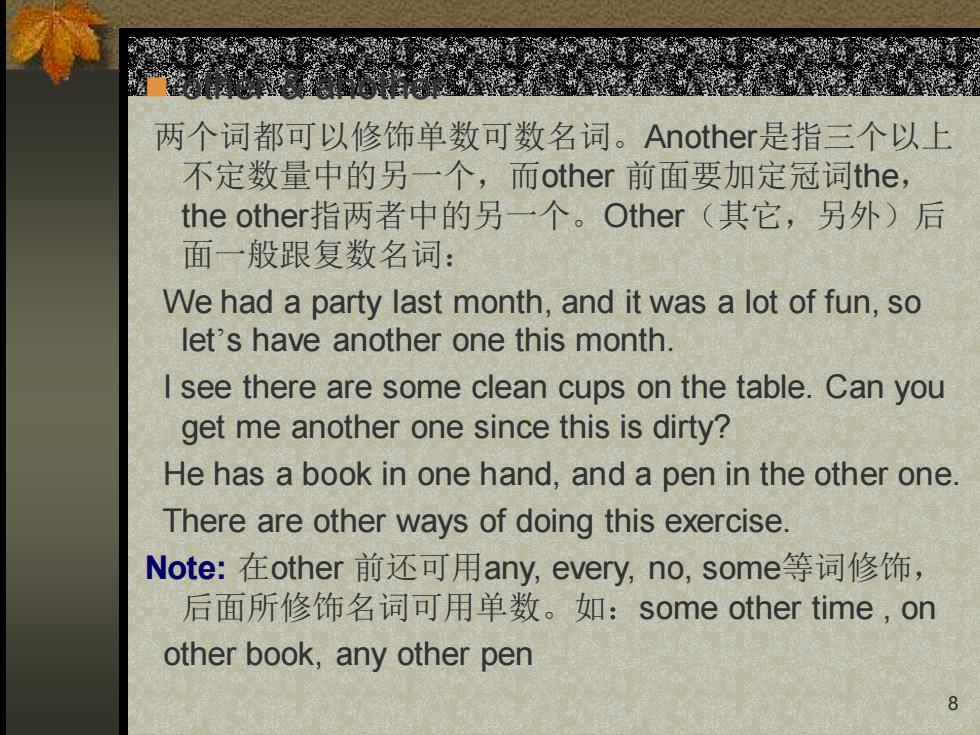
两个词都可以修饰单数可数名词。Another是指三个以上 不定数量中的另一个,而other前面要加定冠词the, the other指两者中的另一个。Other(其它,另外)后 面一般跟复数名词: We had a party last month,and it was a lot of fun,so let's have another one this month. I see there are some clean cups on the table.Can you get me another one since this is dirty? He has a book in one hand,and a pen in the other one. There are other ways of doing this exercise Note:在other前还可用any,every,no,some等词修饰, 后面所修饰名词可用单数。如:some other time,on other book,any other pen 8
8 ◼ other & another 两个词都可以修饰单数可数名词。Another是指三个以上 不定数量中的另一个,而other 前面要加定冠词the, the other指两者中的另一个。Other(其它,另外)后 面一般跟复数名词: We had a party last month, and it was a lot of fun, so let’s have another one this month. I see there are some clean cups on the table. Can you get me another one since this is dirty? He has a book in one hand, and a pen in the other one. There are other ways of doing this exercise. Note: 在other 前还可用any, every, no, some等词修饰, 后面所修饰名词可用单数。如:some other time , on other book, any other pen
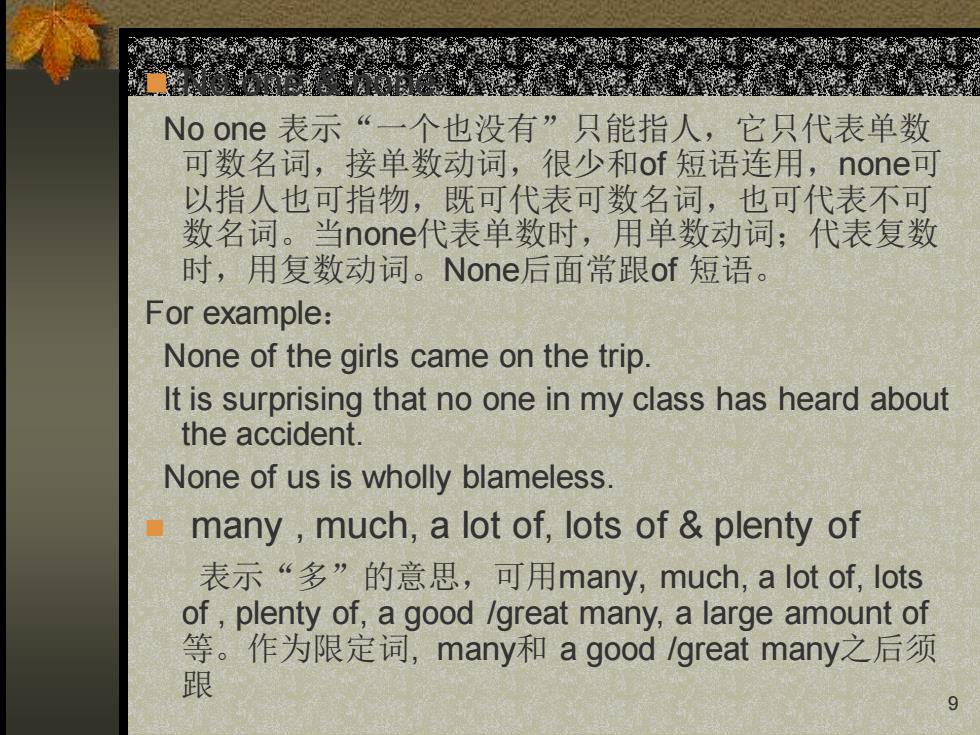
No one表示“一个也没有”只能指人,它只代表单数 可数名词,接单数动词,很少和of短语连用,none可 以指人也可指物,既可代表可数名词,也可代表不可 数名词。当none代表单数时,用单数动词;代表复数 时,用复数动词。None后面常跟of短语。 For example: None of the girls came on the trip It is surprising that no one in my class has heard about the accident. None of us is wholly blameless. many,much,a lot of,lots of plenty of 表示“多”的意思,可用many,much,a lot of,lots of,plenty of,a good /great many,a large amount of 等。作为限定词,many和a good/great many.之后须 9
9 ◼ No one & none No one 表示“一个也没有”只能指人,它只代表单数 可数名词,接单数动词,很少和of 短语连用,none可 以指人也可指物,既可代表可数名词,也可代表不可 数名词。当none代表单数时,用单数动词;代表复数 时,用复数动词。None后面常跟of 短语。 For example: None of the girls came on the trip. It is surprising that no one in my class has heard about the accident. None of us is wholly blameless. ◼ many , much, a lot of, lots of & plenty of 表示“多”的意思,可用many, much, a lot of, lots of , plenty of, a good /great many, a large amount of 等。作为限定词, many和 a good /great many之后须 跟
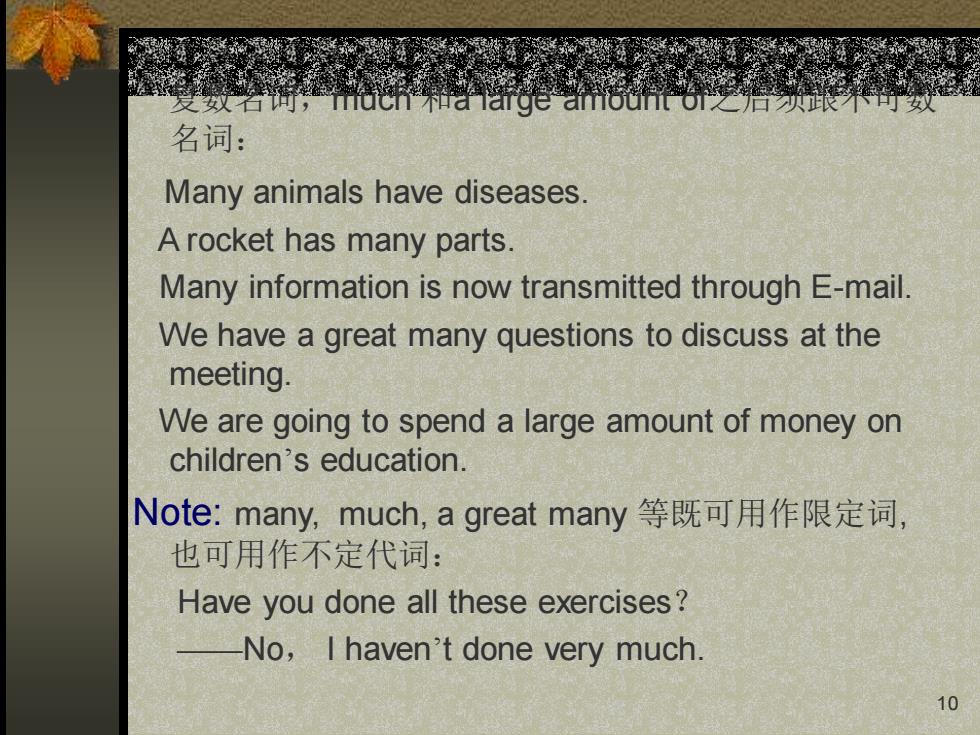
名词: Many animals have diseases A rocket has many parts Many information is now transmitted through E-mail We have a great many questions to discuss at the meeting. We are going to spend a large amount of money on children's education. Note:many,much,a great many等既可用作限定词, 也可用作不定代词: Have you done all these exercises? No,I haven't done very much 10
10 复数名词,much 和a large amount of之后须跟不可数 名词: Many animals have diseases. A rocket has many parts. Many information is now transmitted through E-mail. We have a great many questions to discuss at the meeting. We are going to spend a large amount of money on children’s education. Note: many, much, a great many 等既可用作限定词, 也可用作不定代词: Have you done all these exercises? ——No, I haven’t done very much